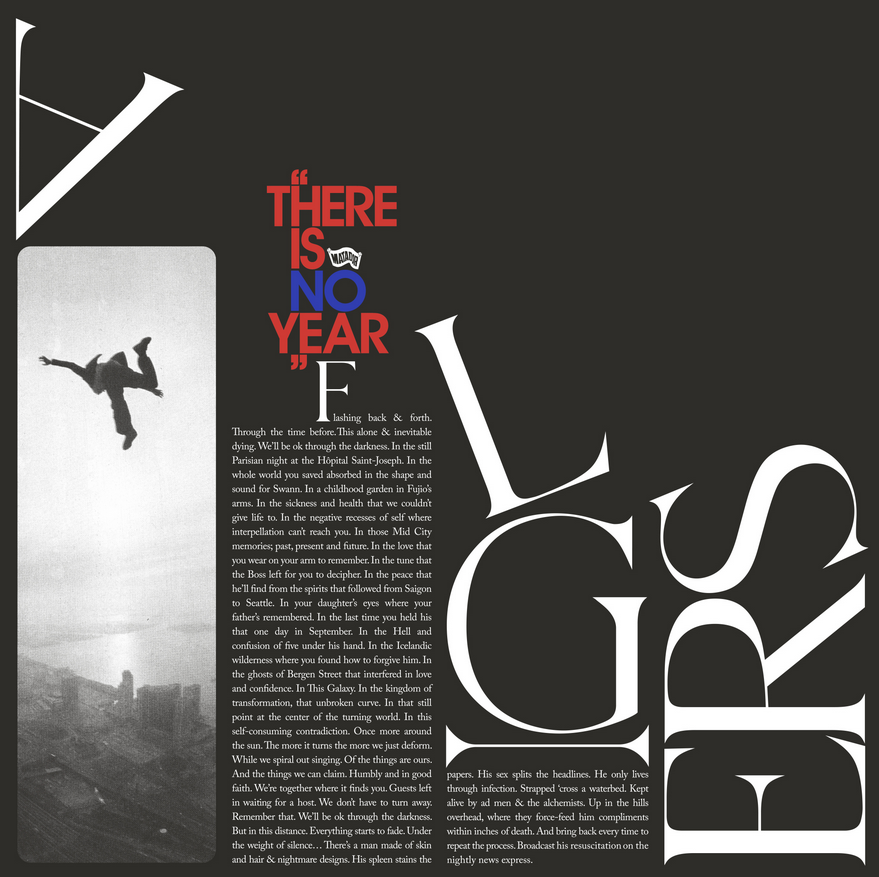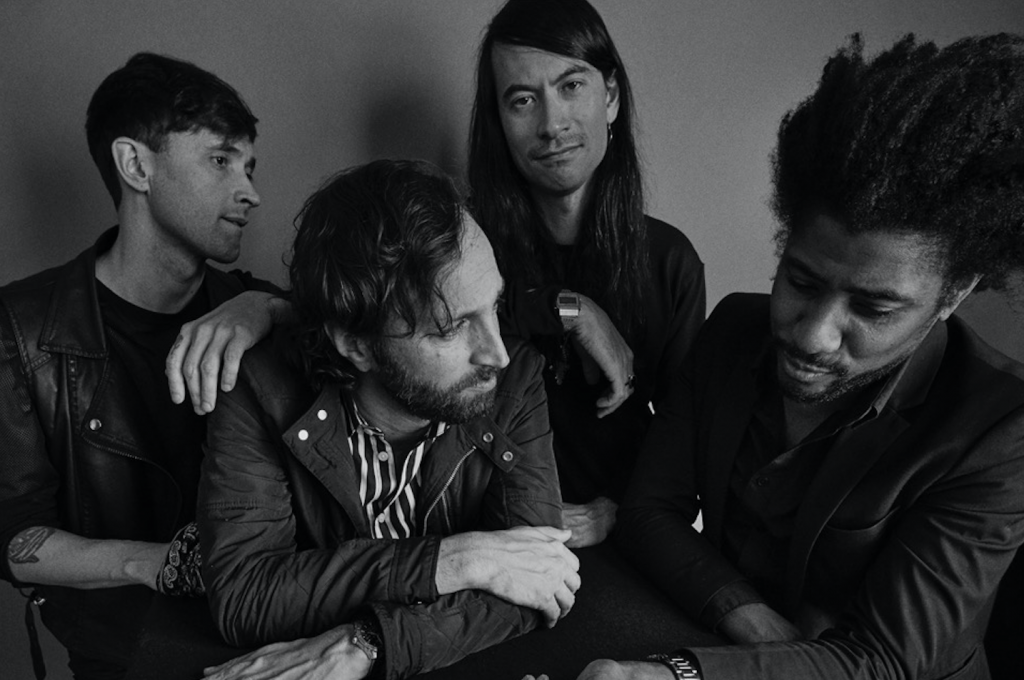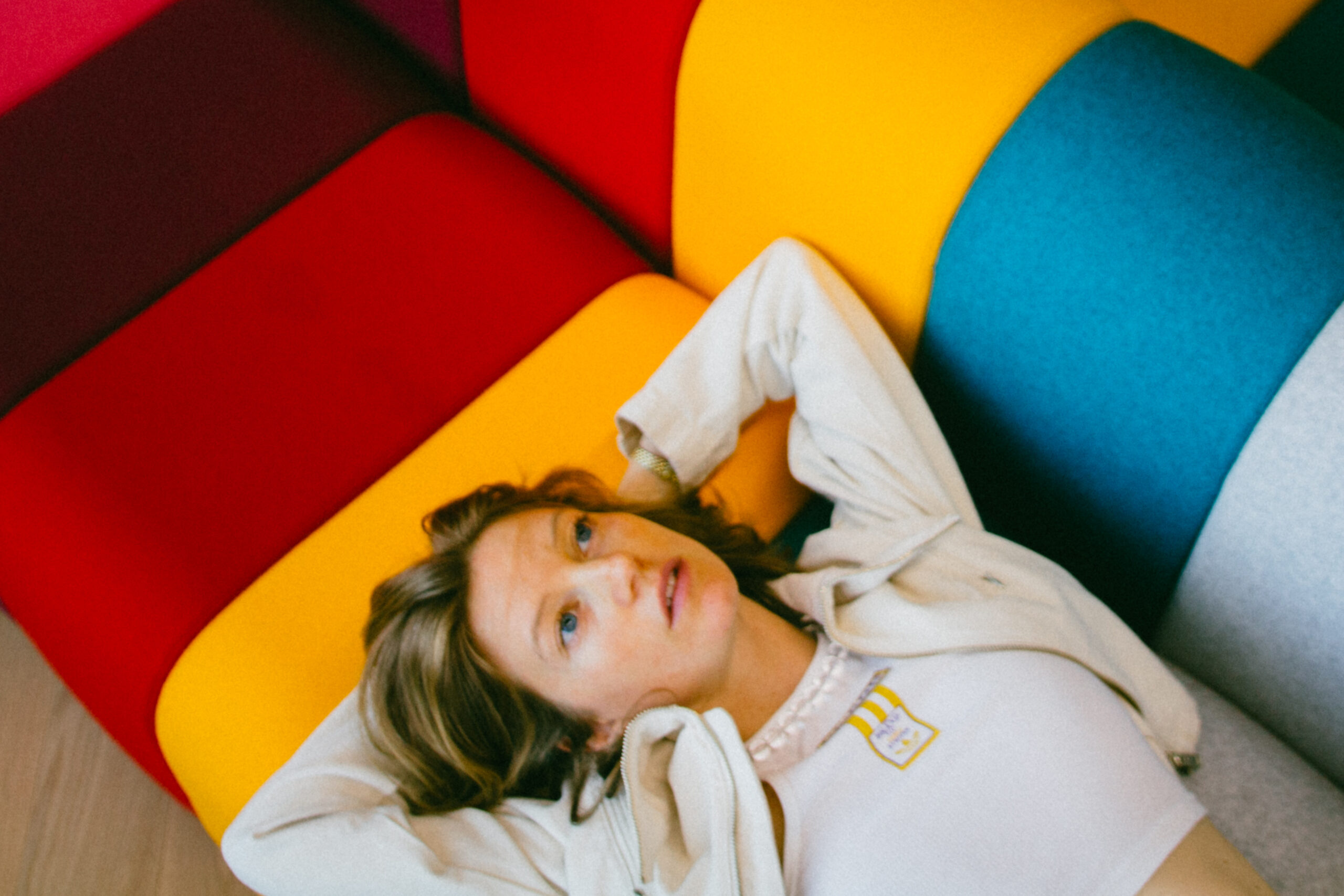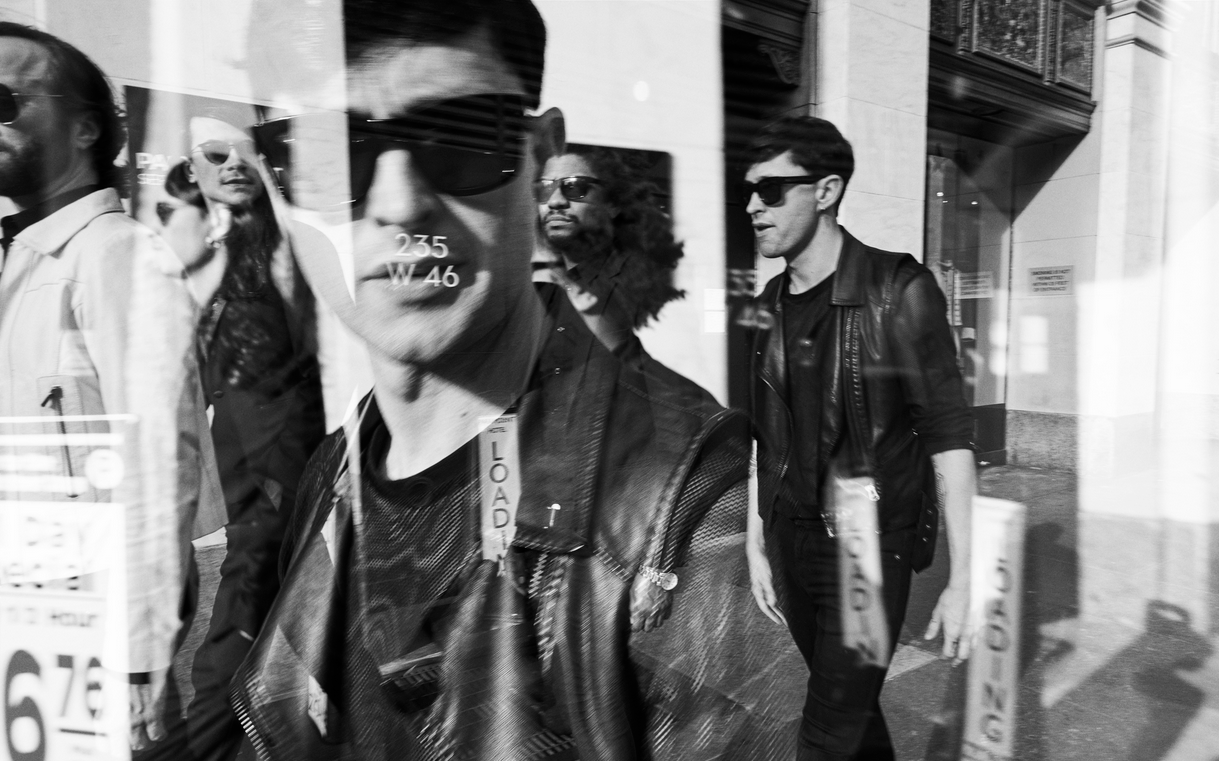Foto-© Christian Högstedt
Das neue Jahrzehnt hat begonnen, aber nicht alles ist neu. Mit dabei ist eine Band, die schon mit ihrem selbstbetitelten Debüt (2015) und The Underside Of Power (2017) alle aufgemischt hat. Völlig beeindruckend ist die drangvolle Art mit der sich Frontmann Franklin James Fisher, Ryan Mahan, Lee Tesche und Matt Tong der Weltuntergangsstimmung entgegenstellen. In ihrem aufgeheizten Sound kommen Gospel, Blues, Industrial, Post-Punk, Trip-Hop und Avantgarde-Rock vor. Der Teaser Can The Sub_Bass Speak war ein Akt der Befreiung und selbst für Algiers-Verhältnisse atypisch. Im Vergleich dazu klingt das neue Album There Is No Year fast schon diszipliniert. Aber natürlich ist alles noch da, die überwältigende Emotionalität, der unnachgiebige Rhythmus, die bedrohliche Atmosphäre, die politische Agenda und Einflüsse von Suicide, James Baldwin, Blind Boys Of Alabama, Einstürzende Neubauten bis zu Chaka Khan. Im Gespräch gibt sich Fisher ruhiger als auf der Bühne. Aber man merkt auch, wie angespannt er ist, wie ihn die Pein mitnimmt, wie er mit Phobien und Angstzuständen kämpft und wie kaputt er alles empfindet. Die beste Therapie sei mehr Musik, sie helfe immer. Wer will da, gerade angesichts der Qualität dieser Band, ernsthaft widersprechen?

You‘ve started the campaign with Can The Sub_Bass Speak, a song which is not on the new album. It‘s a slam poetry avant-jazz jam with a strong message. Why was it important to you to release this kind of track as a teaser?
It‘s about playing with expectation and playing with presumption. Sub_Bass was an exorcism, it‘s something that was extraordinarily cathartic. Once I finished it, there was a weight off my chest, which is the result of constantly having to speak about my race to a vastly white media all the time through the past four years. Now I no longer need to do that.
What kind of situation in the relationship with the media do you mean?
It‘s not from interviews particularly, it‘s just a litany of things that have been said to me my entire life. Literally I‘ve made a list of all the presumptuous racist shit that‘s been said to me my entire life and I just held it up on a mirror and just put it back, that‘s what that is. Examples you can find in the song. It‘s all there. I don‘t need to harp on about racial politics or racial identity anymore, It‘s in that song.

When you started to make music and felt this urge inside of you, who have been your role models?
I got my first guitar when I was 13 in 1994. For the first few years I‘ve played anything because I was so enamoured with the guitar. I always wanted a guitar, I‘ve begged my parents for years. Nobody really played music in my family. They thought a guitar costs about 3000 $. When they buy it, the kid plays it for a week and then throws it under the bed and never wants it again. With me it was different. When I finally got it, I was obsessed with it and played it 15 or 16 hours a day. I just listened to anything I could get my hands on. Eventually I found people like Hendrix, Miles Davis, Jeff Buckley, Radiohead and I found the classic rock canon too.
When did you notice that you are a bit of a vocal powerhouse?
I didn‘t really sing. I was in bands since I was 13 but I didn‘t really sing until Algiers. I was always the lead guitarist in bands. When Ryan (Mahan) and I were writing music at the very beginning we were figuring out what shape things would take. He was singing and I was singing. It just so happened that his voice is quite naturally sweet and very pretty but he was trying to sing loudly and with force. Naturally my voice is really loud and conducive to aggression. I always wanted to sing prettily, but that‘s not what my voice is. We realized through trial and error that we should switch rules of what we‘re trying to do, and this was like an uh-huh moment, this is how I should be singing. Ryan encouraged me to do what my natural inclination was because up until that point I was always altering things I did in order to fit the preconceived ideas of the bands I was in and what they wanted to do. With Algiers it was the first time it was about natural expression and what comes out automatically.
Another striking thing about this band is the use of instruments that are different or uncommon. What‘s the most unusual instrument you‘ve used during the recordings of the new album?
You know, I barely played any instruments on this record. I played some piano, I played one or two keyboards, but for this record it‘s the first time in this band where I did not actively write a lot of music or instrumentation. I concentrated solely on lyrics and wanting to become a better writer because I knew that we were going into a studio situation wherein I didn‘t know what was expected and how much control I would have over those circumstances. In order to not have to deal with that and also in order to control what I could control I felt I needed to evolve as a writer because I didn‘t have that chance during The Underside Of Power. But Lee (Tesche) constantly makes his own instruments. In order to get the strangest sounds and he made this ten-foot board with that giant spring on it and he attached pickups to it in order to create a spring reverb. Through that he‘s got the wildest contraptions you could ever imagine. We did an alternate recording of Dispossession in Atlanta a few weeks back and during that time he made a series of instruments. He made a harp, he made a lot of very strange guitars too…(shows the harp on his phone)…it‘s incredible.

How would you describe the way the four of you interact on this record?
This record was about realizing what each of us does and being very minimal and decisive what each of us does when we create a song that is an Algiers song. We‘ve worked quickly. An exception is the poem I wrote called Misophonia, it is something I worked on for a long time. You know, I needed to catalyze my process. Hopefully the next time we make a record I will be a better lyricist in a way that is satisfactory for me.
Why do you talk about misophonia, the hatred of sound, in such an overt way?
It‘s a condition I suffer from. It‘s not all sound, it‘s like…(rustles with a plastic bag)…I HATE IT!!!…it sounds like people eating and chewing and things like that, I can‘t stand it. It‘s an an anxiety. I have obsessive-compulsive disorder and other things, it‘s basically when you‘re so on edge that you can‘t get a grip. This record is about that in parts, but it‘s really about how life stops making sense and about methods you employ typically or historically in order to find sense. You feel like you‘re in a freefall, everything is chaos and you get to a certain point in your life where parents start dying, the government is run by children, the planet is on the edge of absolute collapse. It‘s where we are as a race of humans, that‘s where we are as a culture, that‘s where we are as a society that‘s predicated on a system which is capitalism that cannot last forever. Relationships fail when you have loss and friends get sick, friendships end, families break apart, all of those things.
When you‘re in a closed environment you can‘t get out of, when you‘re on a plane and people are making noises you find disturbing, how do you deal with that?
I always have headphones on me and I don‘t really go anywhere without listening to music. That‘s another thing, the way that music cures that anxiety. It‘s therapy. Music has helped me to become the man I am right now. It‘s always been a spiritual connection, it still is.

In the opening title track you‘re singing: We‘ll spiral out until the day we all fall…we‘re getting ready for The Sound. Later on you pick the point up again in „Wait For The Sound“. Is the new album meant to be a means to cope with the threat of an upcoming apocalypse?
There are deliberate things that are evolving throughout the entire record and they are all introduced on that first song. The idea of things spiralling out of control, the idea of separation and atomization from people, the idea of sound not just as the literal thing but the idea of sound as something supernatural or something that‘s threatening or something that can be physically violent or something to be afraid of or something that might be just the power of what sound holds or what it can be. The idea of things imploding and hopefully being able to deal with those things.
Why is it important to you to talk about dispossession on the album, like in the track of the same name?
It‘s about labour force, the modern economy, the developed world, all of these things, they‘re not going to last at some point. It‘s also a bit autobiographical. I haven‘t had an apartment for two years, Ryan‘s been homeless for three years, it‘s hard doing what we do because we don‘t have much money, you don‘t have a home, you constantly travel. Don‘t get me wrong: Making music is great. The antidote to that is there‘s no such thing as security, period. It‘s easier to not have things when you don‘t invest so much into the idea of having things. Like Bob Dylan said: When you‘ve got nothing, you‘ve got nothing to lose.
It can be difficult to talk about dispossession in the US. There are people who associate the word with communism and see it as a forbidden subject. Did you get you a lot of flak for the track on social media since the song was already released as a single?
Not that I know of. I haven‘t been on social media since March. I got off of all of it, it‘s not good for my mental health. It‘s all lies, they‘re advertising about their lives they don‘t really lead. I find it to be quite poisonous. It can poison relationships, it can poison self-perception, I don‘t need it in my life anymore. I think we‘re on the radar of a lot of those people just because social media and the internet is an echo chamber. It‘s the effect when you seek out people who are like you, you talk to people who seem to be your friends. You talk to people who share your political opinions and your ideas, like people who have nasty right-wing ideas talking to other people who also have nasty right-wing ideas and they validate their own opinions. It happens in every community, but it‘s not a proper reflection of the world. It can lead you down a very dangerous unfaithful understanding about how things actually work.

A lot of people talk about how everything is serious and political in Algiers. But there‘s also the song Chaka. A dedication to the mighty Chaka Khan, I presume. Let‘s talk about her.
She‘s great, everything she did, as a solo artist or with Rufus. Ain‘t Nobody – that song is amazing! We‘ve got some friends in Switzerland and when we are on tour we get the occasion to stop over and stay with them for a few nights, that‘s really nice. We went to the synth warehouse essentially. There‘s a very wealthy gentleman who has hundreds upon hundreds of synthesizers and pianos. I know I said I‘m not on social media but we did a thing yesterday and I had to download Instagram so I could look at it…(turns on his phone)…here it is, there‘s this picture we took, it‘s just wall-to-wall synthesizers. This was August 28th…erm…I went in with my computer because I knew there was going to be every synthesizer in the world and demoed this one thing on a Roland Juno machine and it was this really funky thing. I didn‘t take anything off it, I was just having fun. It reminded me of Chaka Khan, already on the demo, and then Ryan did his own remix of it. On the record it turned into a very different thing from that original demo. But we kept the title.
The final track Void ends with a positive chant when you sing: And it‘s coming around, it‘s opportunity. A happy ending in the vortex of chaos?
It‘s funny, somebody said today it‘s such an angry song…it‘s punk rock. It‘s fun when we play this one on stage, we‘ve got friends and fans to sing along. We found a way to get out of the commercial echo chamber, you know. Sub_Bass is a soft prelude and then we wind it all up with Void. It‘s like a little wormhole or a portal that takes you somewhere else.
Thanks for the trip, Franklin.
Very insightful questions, thank you very much. I enjoyed that.
Algiers Tour:
14.02.20 Club Volta, Köln
15.02.20 Club Manufaktur, Schorndorf
17.02.20 Frankfurt, Zoom
18.02.20 Beatpol, Dresden
24.02.20 Strom, München
21.04.20 Knust, Hamburg
27.04.20 Lido, Berlin










